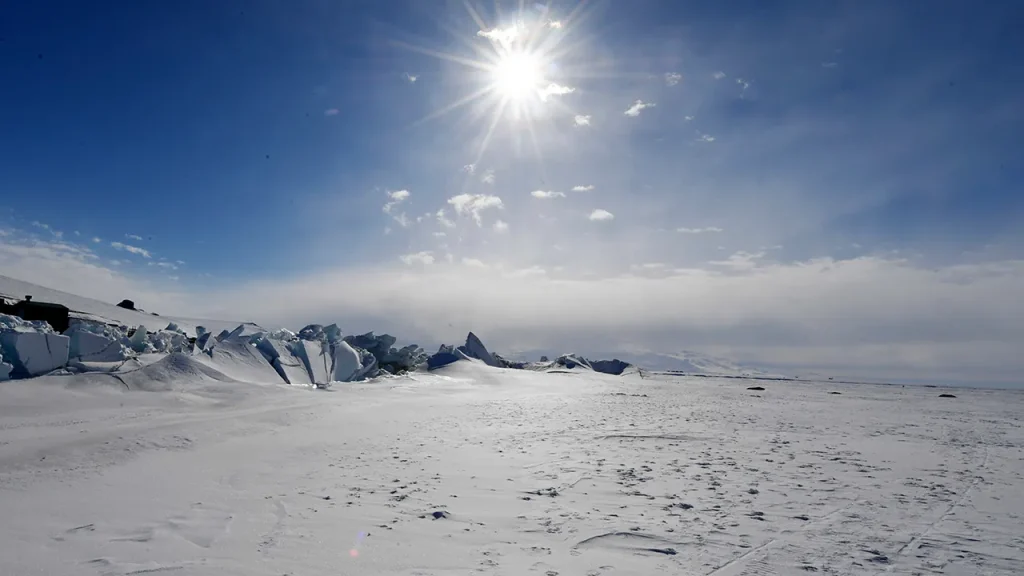A member of a South African research team stationed at the SANAE IV base in Antarctica was subjected to psychological evaluation following serious allegations of physical assault and sexual harassment made by a colleague. This situation has raised concerns about the wellbeing of the team members in the harsh and isolated conditions of Antarctica. Government officials confirmed the incident and stated that interventions are in place to ensure safety and psychological support for the team during their extended stay in one of the world’s most remote locations.
| Article Subheadings |
|---|
| 1) Allegations Surface at Remote Research Base |
| 2) Response from South African Authorities |
| 3) Investigation Details and Findings |
| 4) Living Conditions and Psychological Assessments |
| 5) Importance of Safety in Research Environments |
Allegations Surface at Remote Research Base
On February 27, the South African research team based in Antarctica faced a serious crisis when allegations of assault were raised against one of its members. According to reports, a team member sent an urgent email to authorities expressing concerns over the behavior of a fellow researcher. The email detailed instances where the accused reportedly assaulted the base leader and issued death threats. This alarming behavior prompted the whistleblowing team member to articulate fears for their own safety, stating they were “constantly wondering if I might become the next victim.”
Response from South African Authorities
In light of the reported incidents, South Africa’s Ministry of Environment, which oversees Antarctic missions, issued a statement on Monday evening. They noted that officials and psychological counselors intervened remotely, aiming to mediate the situation and restore peaceful relations among the nine team members. The ministry confirmed that nightly communications took place to monitor the wellbeing of the individuals involved. Essentially, they put procedures in place to manage stress and potential conflict in the remote Antarctic environment.
Investigation Details and Findings
An investigation into the claims of assault and harassment is currently ongoing. Initial reports indicated that the alleged victim was under significant distress due to ongoing threats and accusations. Notably, the ministry clarified that while sexual harassment allegations are being investigated, there were no substantiated claims of sexual assault. As part of the process, the alleged perpetrator has reportedly shown remorse and has actively participated in psychological assessments and counseling sessions. He also issued a formal apology to the affected party. This public admission has been seen as an essential step toward addressing the fallout from the incident and suggests a willingness to make amends.
Living Conditions and Psychological Assessments
Living conditions at the SANAE IV research base are paramount to the success of scientific expeditions, especially in such extreme environments. The team, made up of scientists, engineers, and medical personnel, arrived at the base on February 1 and are slated to stay for approximately 13 months. The base is located on a cliff in Queen Maud Land, far removed from the comforts of civilization and surrounded by a daunting glacial ice sheet. As the Antarctic winter approaches, team members must adapt to prolonged periods of darkness and isolation.
To mitigate the impacts of such an austere living situation, each team member is required to undergo a series of psychological and medical evaluations before deployment. These assessments help ensure individuals are equipped mentally and physically to cope with the extreme conditions encountered in Antarctica. Officials noted that it is commonplace for team members to experience adjustment difficulties upon arrival at the remote base, despite previous evaluations showing no immediate concerns.
Importance of Safety in Research Environments
The recent events at SANAE IV highlight the critical importance of safety and mental wellbeing in research environments, especially those that are geographically isolated and involve close living quarters. The South African Ministry of Environment reiterated the necessity of ongoing evaluations and support structures to ensure that all team members remain safe and mentally fit. The incident has sparked discussions regarding protocols for conflict resolution and mental health management in isolated settings, with experts urging for immediate action to prevent future occurrences.
As the investigation unfolds, it remains clear that concerns for safety are paramount in all research missions, particularly in locations like Antarctica, where hazards extend beyond the environmental challenges.
| No. | Key Points |
|---|---|
| 1 | An alleged incident of assault and harassment was reported among a South African research team in Antarctica. |
| 2 | The South African Ministry of Environment is investigating the claims and has provided psychological support to the team. |
| 3 | The accused has displayed remorse and engaged in psychological evaluation and mediation efforts. |
| 4 | The living conditions at SANAE IV involve significant challenges such as isolation, darkness, and psychological adjustments. |
| 5 | The situation emphasizes the need for stringent safety protocols in remote research environments. |
Summary
The troubling incidents reported at the SANAE IV research base serve as a stark reminder of the unique challenges faced by teams operating in extreme and isolated conditions. The responses from both the team members and the South African authorities showcase an ongoing commitment to ensuring safety and support for all researchers involved. As investigations continue, the insights gained from this episode may help bolster future protocols aimed at maintaining mental and physical well-being in similar settings across the globe.
Frequently Asked Questions
Question: What is SANAE IV?
SANAE IV is a South African research base located in Antarctica, primarily used for scientific research and exploration.
Question: What measures are in place to support the mental health of team members in isolated locations?
Teams at such research bases undergo psychological evaluations before deployment and have access to mental health resources and counseling during their stay to manage stress and interpersonal relationships.
Question: How long do research teams typically stay at SANAE IV?
Research teams generally stay at the SANAE IV base for about 13 months, which includes a challenging winter period with prolonged darkness and harsh conditions.


